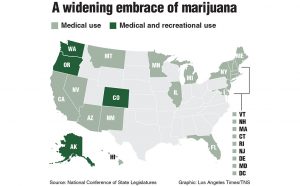
As Americans heal from the most heated election in the last decade, millions conversely rejoice at the sweeping reform of marijuana prohibition in seven states. Thankfully, this includes Florida, which now plans to legalize marijuana for medicinal use under Amendment 2, becoming one of 28 states to legalize marijuana in some capacity.
While proponents of Amendment 2 publicly celebrate its passing, praising figures like John Morgan, who pushed to get marijuana to those who desperately need it, the senseless prohibition of marijuana persists. Even under these new laws, police will continue to arrest people in droves for marijuana if they lack a prescription from their doctor.
According to data released by the FBI, police arrested 643,000 people for marijuana in 2015, 574,000 of which possessed, but did not sell or distribute the controlled substance. In comparison, police arrested 505,000 people for all violent crimes, including rape, murder and assault.
Drug offenders currently make up 17 percent of inmates in state prisons and 46.4 percent of those in federal prisons. These figures contribute to the immensely high incarceration rate and prison population in the United States, which imprisons more individuals than any other country.
“Though only 5 percent of the world’s population lives in the United States, it is home to 25 percent of the world’s prison population,” said Kentucky Senator Rand Paul. “Not only does the current overpopulated, underfunded system hurt those incarcerated, it also digs deeper into the pockets of taxpaying Americans.”
Furthermore, marijuana negatively contributes to the general welfare of the American people on another front: race. African Americans use marijuana at about the same rate as Caucasians but are nearly four times more likely to be arrested for doing so.
Opponents argue that while the actions of individual police officers may be reprehensible, the intent behind the drug war was always to promote the common good of the populous and to keep the American people safe and away from harmful substances. John Ehrlichman, who served as chief domestic adviser to President Richard Nixon when he first announced the war on drugs in 1971, contended otherwise. Decades after spending 18 months in federal prison for his involvement in the Watergate scandal, Ehrlichman provided further insight into the drug war in a recently uncovered interview with Dan Baum.
“The Nixon campaign in 1968, and the Nixon White House after that, had two enemies: the antiwar left and black people. You understand what I’m saying? We knew we couldn’t make it illegal to be either against the war or black, but by getting the public to associate the hippies with marijuana and blacks with heroin, and then criminalizing both heavily, we could disrupt those communities. We could arrest their leaders, raid their homes, break up their meetings, and vilify them night after night on the evening news. Did we know we were lying about the drugs? Of course we did,” stated Ehrlichman in the interview.
Those willing to admit to the dark roots of the drug war and still support marijuana prohibition assert that despite its original ties to systemic racism, the United States needs the war on drugs to ensure the safety of the public. However, this contention has no basis. Marijuana prohibition costs federal and state governments an estimated $17.24 billion every year, according to Harvard University economist Jeffrey Miron. Since 1971, the U.S. has spent over a trillion dollars on the war on drugs. Even so, the U.S. has nothing to show for it, as it leads the world in illegal drug use.
In contrast, states that legalize recreational marijuana see an influx of revenue. Forbes estimates Colorado, the first state to allow the use of marijuana for recreational purposes, will bring in more than $150 million in total tax dollars by the end of 2016. Additionally, Washington state has collected $85 million in taxes from recreational marijuana.
Moreover, following its first year of full decriminalization, Colorado spent $40 million in revenue on public school construction and created 10,000 jobs related to cannabis, demonstrating the potential of a legal marijuana market to benefit communities. Overall, Colorado, Washington and Oregon all exceeded initial tax revenue estimates according to the Drug Policy Alliance, totaling $552 million.
To recapitulate, the legalization of medical marijuana benefits Florida, as it does every other state with legal medical marijuana. Nevertheless, the complete decriminalization of marijuana nationwide would significantly impact incarceration, jobs, revenue and spending in a positive way.
